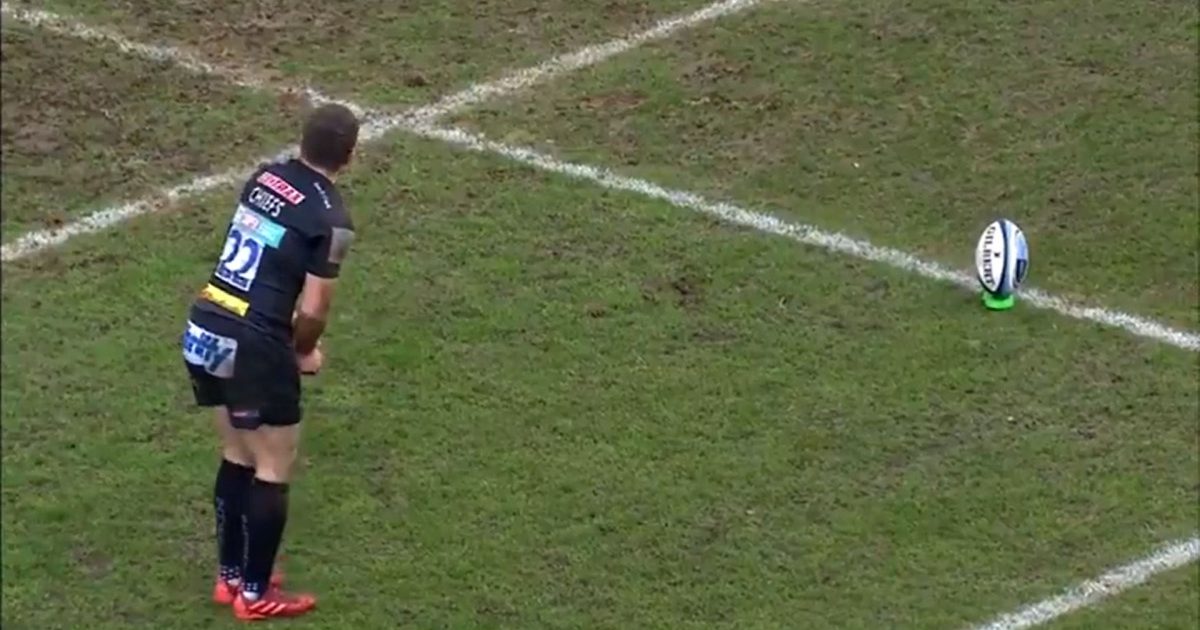Video: Ben Kay proves the weekend's most debated call was absolutely right

Former England second row Ben Kay has Tweeted a video that proves beyond doubt that referee Christophe Ridley was absolutely correct in his controversial charge-down call at the end of the Exeter and Northampton Saints thriller at Sandy Park.
Chiefs flyhalf Joe Simmonds was charged down by Saints players prior to taking a crucial conversion, a charge down Ridley interpreted as legal. It caused consternation among Chiefs players on the pitch and fans online in the aftermath. Ridley adjudged that Simmonds had moved – without reference to the TMO – and that Northampton were within their rights to chase him down and spoil the kick.
According to Law Eight:
‘All opposing players retire to their goal line and do not overstep that line until the kicker begins the approach to kick. When the kicker does this, they may charge or jump to prevent a goal but must not be physically supported by other players in these actions.’
A World Rugby Law clarification in 2020 then added: ‘The moment the kicker moves in any direction it is deemed that he is ‘approaching to kick.’ The reason for this interpretation is simplicity, otherwise the referee would have to judge when the kicker first moves, and in what direction. It would also be open to misinterpretation by players, match officials and spectators.’
A charge down in New Zealand last year caused NZ Rugby to formally query “What is meant by the phrase approach to kick?” and WR clarified the law.
Paul Smith ??? explains yesterday's super controversial decision & why Christophe Ridley might be righthttps://t.co/QeIpbj7ngC
— RugbyPass (@RugbyPass) February 21, 2021
The problem was initial close-up footage didn’t show clearly whether Simmonds moved or not.
Ben Kay however has found a wider angle of the contested kick and has tweeted it: “As Rob Baxter (very classily) admitted in the clubs post match interview straight after game, the wider angle of Simmonds conversion shows he does take a small step towards the ball before stopping again”
As Rob Baxter (very classily) admitted in the clubs post match interview straight after game, the wider angle of simmonds conversion shows he does take a small step towards the ball before stopping again pic.twitter.com/mYXQJtn7CX
— Ben Kay (@BenKay5) February 20, 2021
As Kay points out Exeter Director of Rugby Rob Baxter refused to use the decision as an excuse for the loss, his side’s first loss to Saints at Sandy Park in seven years.
“As far as I can tell, I think ‘Simmo’ moved, they charged and that’s what you are allowed to do,” Baxter said. “Until I watch the video I don’t know, but in a lot of ways it is irrelevant to me.
“It is not the referee’s decision at the end which has decided that game.
“We’ve not taken our opportunities, which is a little bit uncharacteristic of us, and you have to give Northampton massive credit for how they fought on their try-line.”
"Everyone was laughing at first and then the bus just went deadly silent."https://t.co/ydGh6oFd1C
— RugbyPass (@RugbyPass) February 20, 2021
















